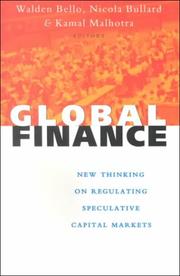| Listing 1 - 10 of 83 | << page >> |
Sort by
|
Book
Year: 2021 Publisher: Washington, D.C. : International Monetary Fund,
Abstract | Keywords | Export | Availability | Bookmark
 Loading...
Loading...Choose an application
- Reference Manager
- EndNote
- RefWorks (Direct export to RefWorks)
Finance & Development, March 2021.
Economic development. --- Financial institutions, International. --- United States
Book
Year: 2022 Publisher: Washington, D.C. : International Monetary Fund,
Abstract | Keywords | Export | Availability | Bookmark
 Loading...
Loading...Choose an application
- Reference Manager
- EndNote
- RefWorks (Direct export to RefWorks)
Amid a multispeed economic recovery—including within countries and across sectors, age groups, genders, and skill levels—this issue explores several cross-cutting themes for emerging markets.
Economic development. --- Financial institutions, International. --- United States
Book
Year: 2021 Publisher: Washington, D.C. : International Monetary Fund,
Abstract | Keywords | Export | Availability | Bookmark
 Loading...
Loading...Choose an application
- Reference Manager
- EndNote
- RefWorks (Direct export to RefWorks)
Finance & Development, March 2021.
Economic development. --- Financial institutions, International. --- United States
Book
Year: 2021 Publisher: Washington, D.C. : International Monetary Fund,
Abstract | Keywords | Export | Availability | Bookmark
 Loading...
Loading...Choose an application
- Reference Manager
- EndNote
- RefWorks (Direct export to RefWorks)
Finance & Development, March 2021.
Economic development. --- Financial institutions, International. --- United States
Periodical
Year: 2002 Publisher: Paris : Banque de France,
Abstract | Keywords | Export | Availability | Bookmark
 Loading...
Loading...Choose an application
- Reference Manager
- EndNote
- RefWorks (Direct export to RefWorks)
Book
Year: 1993 Publisher: Santa Monica, CA : RAND Corporation,
Abstract | Keywords | Export | Availability | Bookmark
 Loading...
Loading...Choose an application
- Reference Manager
- EndNote
- RefWorks (Direct export to RefWorks)
In 1944, an international conference was convened in Bretton Woods, New Hampshire, to lay out a framework for international economic relations in the postwar world. The institutions that grew out of that conference --the International Monetary Fund, the World Bank, and the General Agreement on Tariffs and Trade (GATT)--have generally served us well. But today's international economic environment is much different than could have been foreseen in 1944, and the time may be ripe for a broad rethinking of international economic institutions and arrangements. Four fundamental policy questions underlie debates about the future nature and purposes of international economic institutions. First, should concerted efforts be made to stabilize exchange rates among major currencies? Second, has the expansion of private credit and capital markets eliminated the need for official sources of international credit? Third, do the GATT principles of nondiscrimination and multilateralism still provide the best basis for expanding world trade? Fourth, what aspects of economic regulation require international cooperation?
Book
Year: 2012 Publisher: Munich, Germany : Südosteuropa-Gesellschaft,
Abstract | Keywords | Export | Availability | Bookmark
 Loading...
Loading...Choose an application
- Reference Manager
- EndNote
- RefWorks (Direct export to RefWorks)
Literaturangaben. Durchsuchbare elektronische Faksimileausgabe als PDF. Digitalisiert im Rahmen des DFG-Projektes Digi20 in Kooperation mit der BSB München. OCR-Bearbeitung durch den Verlag Otto Sagner.
Financial institutions, International --- Europe, Central --- Europe, Eastern --- Economic conditions --- Finanzorganisationen --- Ostmittel --- Politik --- Rolle --- Schönfeld --- Serbien --- Slavische Sprachwissenschaft --- Südosteuropa --- Wirtschaft --- Zeitgeschichte
Periodical
Abstract | Keywords | Export | Availability | Bookmark
 Loading...
Loading...Choose an application
- Reference Manager
- EndNote
- RefWorks (Direct export to RefWorks)
Book
ISBN: 0801454611 0801453119 1322503311 9780801454615 9780801453113 0801454603 9780801454608 Year: 2015 Publisher: Ithaca, New York : Cornell University Press,
Abstract | Keywords | Export | Availability | Bookmark
 Loading...
Loading...Choose an application
- Reference Manager
- EndNote
- RefWorks (Direct export to RefWorks)
In Ruling Capital, Kevin P. Gallagher demonstrates how several emerging market and developing countries (EMDs) managed to reregulate cross-border financial flows in the wake of the global financial crisis, despite the political and economic difficulty of doing so at the national level. Gallagher also shows that some EMDs, particularly the BRICS coalition, were able to maintain or expand their sovereignty to regulate cross-border finance under global economic governance institutions. Gallagher combines econometric analysis with in-depth interviews with officials and interest groups in select emerging markets and policymakers at the International Monetary Fund, the World Trade Organization, and the G-20 to explain key characteristics of the global economy. Gallagher develops a theory of countervailing monetary power that shows how emerging markets can counter domestic and international opposition to the regulation of cross-border finance. Although many countries were able to exert countervailing monetary power in the wake of the crisis, such power was not sufficient to stem the magnitude of unstable financial flows that continue to plague the world economy. Drawing on this theory, Gallagher outlines the significant opportunities and obstacles to regulating cross-border finance in the twenty-first century.
International finance --- Financial institutions, International --- Political aspects. --- Law and legislation. --- International monetary system --- International money --- Finance --- International economic relations --- Political aspects --- Law and legislation --- E-books

ISBN: 1856497925 Year: 2000 Publisher: London Zed Books
Abstract | Keywords | Export | Availability | Bookmark
 Loading...
Loading...Choose an application
- Reference Manager
- EndNote
- RefWorks (Direct export to RefWorks)
Money market. Capital market --- International economic relations --- International finance --- 831 Internationale politieke economie --- Capital movements --- Capital movements. --- Financial institutions, International. --- International finance. --- Law and legislation. --- Financial institutions, International --- International monetary system --- International money --- Finance --- International financial institutions --- Capital flight --- Capital flows --- Capital inflow --- Capital outflow --- Flight of capital --- Flow of capital --- Movements of capital --- Balance of payments --- Foreign exchange --- Law and legislation
| Listing 1 - 10 of 83 | << page >> |
Sort by
|

 Search
Search Feedback
Feedback About UniCat
About UniCat  Help
Help News
News